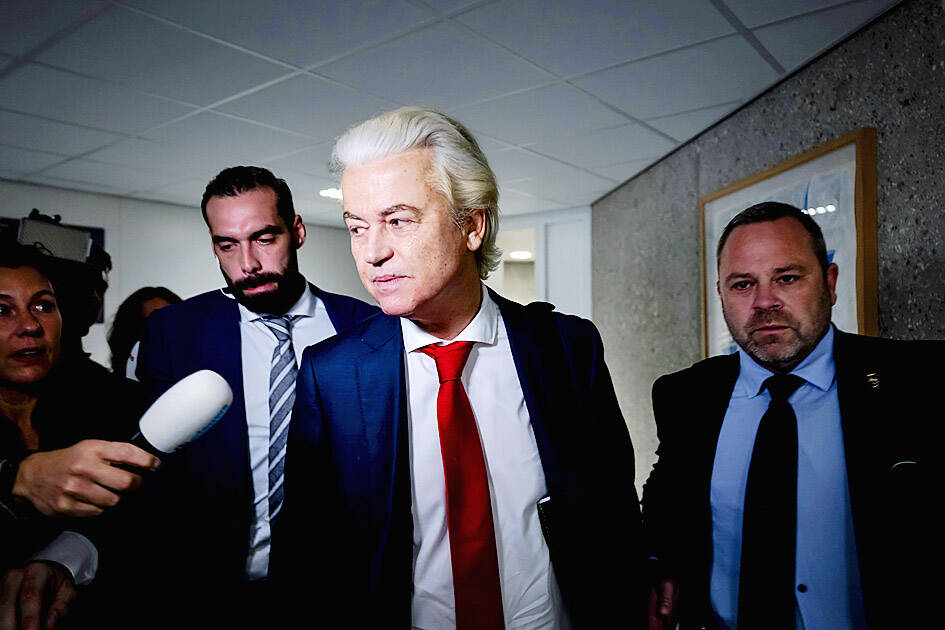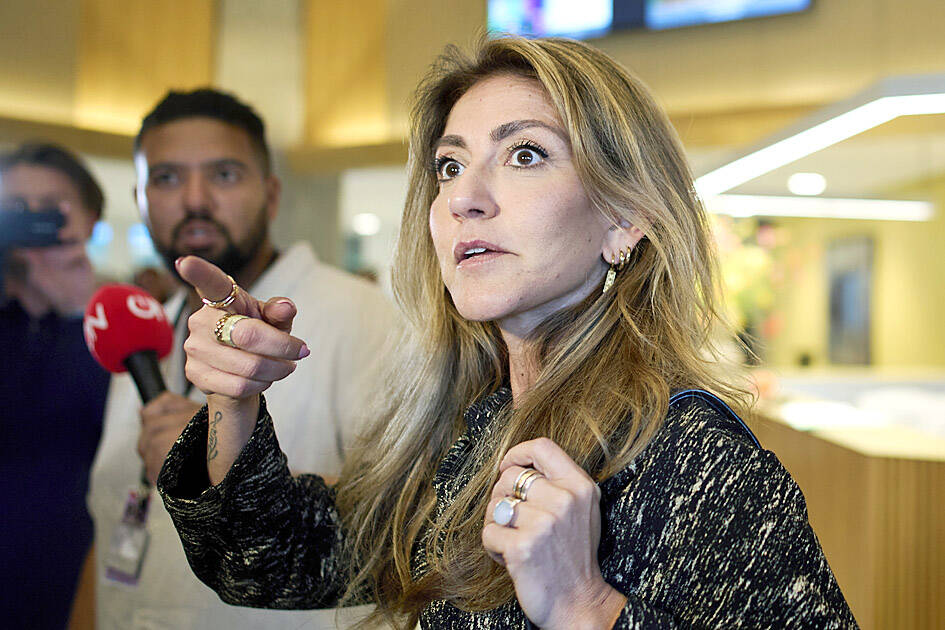Far-right Dutch leader Geert Wilders yesterday withdrew his party from the government in a row over immigration, bringing down a shaky coalition and likely ushering in snap elections.
Wilders has been frustrated with what he saw as the slow pace of introducing the “strictest-ever immigration policy,” agreed with coalition partners after his shock election win in November 2023.
“No signature for our asylum plans... PVV leaves the coalition,” Wilders wrote on X, referring to his far-right Freedom Party.

Photo: EPA-EFE
The withdrawal opens up a period of political uncertainty in the EU’s fifth-largest economy and major exporter, as far-right parties make gains across the continent.
The latest government crisis also comes just weeks before the Netherlands is due to host world leaders for a NATO summit.
Last-ditch crisis talks yesterday morning lasted barely half an hour before the leaders of the four coalition parties came out in a testy mood.

Photo: AP
“I have just informed the prime minister that I will withdraw the PVV ministers from the Cabinet and that we can no longer bear responsibility for this,” Wilders said.
“I signed up for the strictest asylum policy, not for the downfall of the Netherlands and that our responsibility for this Cabinet therefore ends at this moment,” he added.
Eighteen months after his surprise election win sent shock waves through Europe, polls suggest his PVV is still the strongest.
However, the gap with his nearest rivals has narrowed, with the left-wing Green/Left party of former European Commission vice president Frans Timmermans following close behind.
The liberal VVD party, a traditional powerhouse in Dutch politics, is also running near the top two, meaning any election would likely be closely fought.
VVD leader Dilan Yesilgoz, visibly angry, described Wilders’ move as “super irresponsible,” adding that she was afraid it would open the door to left-wing parties.
“How can you do this to the Netherlands?” she told reporters.
Late last month, Wilders called an impromptu press conference to announce his “patience was up” with the government of Dutch Prime Minister Dick Schoof. He threatened to torpedo the coalition if a new 10-point plan to crimp immigration was not implemented within a few weeks.
His plan included border closures for asylum seekers, tougher border controls and deporting dual nationals convicted of a crime.
Summarizing his demands, he said: “Close the borders for asylum seekers and family reunifications. No more asylum centers opened. Close them.”
Political and legal experts criticized the plans as unworkable or illegal, with some suggesting Wilders was creating a crisis to collapse the government.
Wilders’ ambitions to lead his country were frustrated after his election win, as his coalition partners blocked his bid for prime minister, settling instead on Schoof as a compromise candidate.
The leaders of the four coalition partners agreed not to take up Cabinet positions, instead running their parties as parliamentary chiefs.
Wilders has been an uncompromising figure in parliament, his quick-witted jousting with Timmermans being a highlight of debates.
He has frequently said that the only way to implement his anti-immigrant policies is for him to become prime minister.
However, in the fractured Dutch political system, no party can win an absolute majority in the 150-seat parliament and Wilders will need partners.
He can count on the support of the BBB farmers’ party. The backing of the VVD — currently an uneasy coalition partner — is less certain.
The fourth party in the coalition — the anti-corruption New Social Contract — has seen its support collapse since charismatic leader Pieter Omtzigt stepped down.

VAGUE: The criteria of the amnesty remain unclear, but it would cover political violence from 1999 to today, and those convicted of murder or drug trafficking would not qualify Venezuelan Acting President Delcy Rodriguez on Friday announced an amnesty bill that could lead to the release of hundreds of prisoners, including opposition leaders, journalists and human rights activists detained for political reasons. The measure had long been sought by the US-backed opposition. It is the latest concession Rodriguez has made since taking the reins of the country on Jan. 3 after the brazen seizure of then-Venezuelan president Nicolas Maduro. Rodriguez told a gathering of justices, magistrates, ministers, military brass and other government leaders that the ruling party-controlled Venezuelan National Assembly would take up the bill with urgency. Rodriguez also announced the shutdown

Civil society leaders and members of a left-wing coalition yesterday filed impeachment complaints against Philippine Vice President Sara Duterte, restarting a process sidelined by the Supreme Court last year. Both cases accuse Duterte of misusing public funds during her term as education secretary, while one revives allegations that she threatened to assassinate former ally Philippine President Ferdinand Marcos Jr. The filings come on the same day that a committee in the House of Representatives was to begin hearings into impeachment complaints against Marcos, accused of corruption tied to a spiraling scandal over bogus flood control projects. Under the constitution, an impeachment by the

Exiled Tibetans began a unique global election yesterday for a government representing a homeland many have never seen, as part of a democratic exercise voters say carries great weight. From red-robed Buddhist monks in the snowy Himalayas, to political exiles in megacities across South Asia, to refugees in Australia, Europe and North America, voting takes place in 27 countries — but not China. “Elections ... show that the struggle for Tibet’s freedom and independence continues from generation to generation,” said candidate Gyaltsen Chokye, 33, who is based in the Indian hill-town of Dharamsala, headquarters of the government-in-exile, the Central Tibetan Administration (CTA). It

China executed 11 people linked to Myanmar criminal gangs, including “key members” of telecom scam operations, state media reported yesterday, as Beijing toughens its response to the sprawling, transnational industry. Fraud compounds where scammers lure Internet users into fake romantic relationships and cryptocurrency investments have flourished across Southeast Asia, including in Myanmar. Initially largely targeting Chinese speakers, the criminal groups behind the compounds have expanded operations into multiple languages to steal from victims around the world. Those conducting the scams are sometimes willing con artists, and other times trafficked foreign nationals forced to work. In the past few years, Beijing has stepped up cooperation